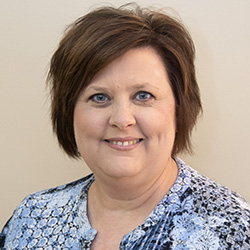Our primary aim is to train and develop highly-qualified, compassionate, competent, professional Gastroenterology/Hepatology physicians that, once graduated, are ready to be champion leaders to UAB Heersink School of Medicine, the state of Alabama and beyond. UAB Gastroenterology differentiates itself from other programs by capitalizing on its strength of diverse patient exposure. This is driven by outstanding faculty that provide not only general gastroenterology and hepatology exposure but exposure to all areas of subspecialties - such as IBD, Advanced Endoscopy, Transplant Hepatology, Motility, and research. We consistently integrate the knowledge of experts outside of the field of gastroenterology to provide a multidisciplinary approach to patient care. These factors are the pieces that fit together to develop outstanding collegiality and camaraderie throughout the fellowship program and within our health system.
Meet Our Clinician Educators

Meagan Gray, MD
UAB Hepatology provides a unique training experience for fellows to learn about the care of a variety of liver diseases in addition to cirrhosis and liver transplantation. As the only transplant center in Alabama and one of the largest in the country, we have a broad referral base with many unique and challenging cases. Our fellows collaborate closely with Diagnostic and Interventional Radiology, Transplant Surgery, and Advanced Endoscopy to provide comprehensive care for our patients. We are proud of our collegial environment across all specialties which enhances our fellow’s educational experience.

Fred Weber, MD
UAB is a truly exceptional institution that offers several distinct advantages over most other Gastroenterology and Hepatology fellowship programs. First and perhaps most importantly, is the culture of the entire institution. There is a culture of collegiality and teamwork that is truly exceptional and unlike anywhere I have seen in my 41 years in medicine. I had heard this prior to coming to UAB in 2009 but experiencing this culture has proven even more rewarding than I had ever hoped could occur in an academic career. This culture permeates well beyond the Division and even well beyond the Department of Medicine to include all other subspecialties. Second, the clinical volume is heavy and includes great diversity and a wonderful patient mix that is ideal for a broad training experience. Third, academic excellence permeates the clinical enterprise as well as the research enterprise. Trainees will learn the right way to do things and will have fun along the way!

Ali Ahmed, MD
UAB generates high clinical volumes, which enables our fellows’ sufficient repetition to master general endoscopy. Our advanced endoscopy team provides training from recognized experts in all aspects of interventional endoscopy providing the trainee exposure to ERCP, therapeutic EUS, advanced polyp resection (EMR/ESD), advanced optical imaging, POEM and endoscopic suturing among other procedures. Clinical faculty provide mentorship for scholarship activities and most trainees have opportunities to present at national conferences. A collegial group of faculty and fellows rounds out a wonderful training environment.
Our Interview Process
We will participate in the National Registry Match Program (NRMP) for the upcoming interview season. We accept applications via ERAS.
Deadline for applications via ERAS: August 10
-
When do you interview for potential fellowship applicants?
We will begin interviewing applicants in September and continue through October.
-
Do you have specific application requirements?
USMLE score is considered but a specific score has not been made a requirement.
Application Submission Requirements:
-
Current CV (updated within 3 months)
-
Medical School Transcripts (and diploma if requested)
-
Medical School Dean’s Letter
-
Three (3) total Letters of Recommendation (including former program directors)
-
Certificate/verification from previous residency training
-
Must be eligible for Alabama Medical License and Alabama Controlled Substance Certificate (all step scores completed at the time of application)
-
Must be eligible for Federal DEA registration
-
Valid ECFMG Certificate (IMG only)
All applications will be reviewed via ERAS.
-
-
Do you sponsor H1B and J1 Visas?
Yes, the division can sponsor these Visas.
>> Learn more about graduate medical education in the UAB School of Medicine
Contact
 If you have any additional questions, please do not hesitate to contact us at any time.
If you have any additional questions, please do not hesitate to contact us at any time.
Monti Nix
Education Administrator
205-996-2459
monicanix@uabmc.edu